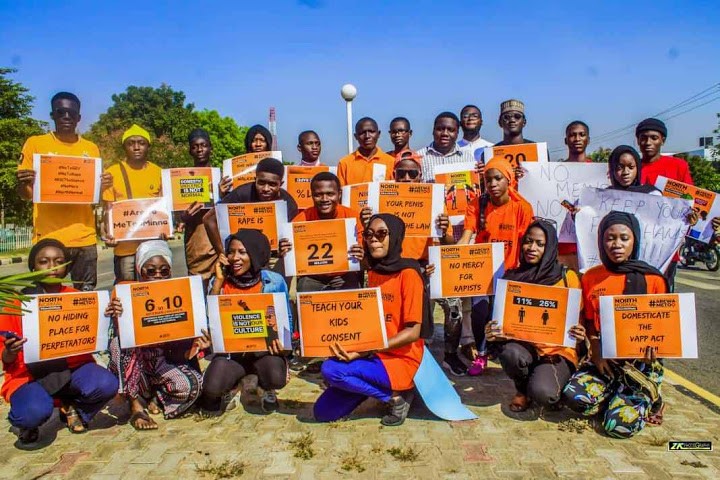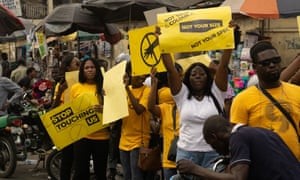By Tina Ndi
Recent media cases have again reminded us of the issue of sexual harassment. In Ogun state, the Commissioner for Environment was suspended for the attempted rape of a 16-year-old girl. The Deeper Life High School saga in Akwa Bom State shows that this is not just a case of harassment of women and girls, although it is usually. This follows from the rape and murder of a young woman in a church in Benin City last year and many other cases.
The international campaign #MeToo has raised the issue, but sexual harassment isn’t just a problem for celebrities. It’s happening all over the place, including in ordinary workplaces everywhere – especially where the bosses have so much power.
It’s not just about punishing cases of rape with harsh sentences, most cases of rape and sexual harassment go unreported. Even when reported, few result in a conviction. We have to try and stop such incidents happening in the first place. We have to work together and try to change the culture of our work places and organise against the blatant lack of respect and care for women and girls.
It’s a common occurrence. The results of a survey published by NOIPolls in July 2019 suggested that up to one in every three girls and young women living in Nigeria have experienced at least one form of sexual assault by the time they reach 25. Most Nigerians (85%) believe that there is a high prevalence of rape. This is confirmed by the Minister for Women Affairs and Social Development who claimed late in 2019 that about two million women and girls are raped every year.

Protesters in front of the Niger State House of Assembly, Minna, November 22, 2019. Photo: Ismail Suleiman
BBC Africa Eye sent undercover journalists posing as students inside the universities of Lagos and Ghana in late 2019. Reporter Kiki Mordi revealed how sexual harassment of students is the norm in these institutions.
Sexual harassment is also a key issue related to insecurity as both Boko Haram and the army have used rape as part of their war in the North East. Women and girls in IDP camps are also particularly at risk. A recent survey showed that the chance of being sexually exploited was higher after women took refuge in IDP camps, with over 80% suffering this within a year of being in a camp. But it is also an issue within families as many women are raped by their husbands or boyfriends.
About 1 in 4 women in Nigeria have experienced intimate partner violence, and nearly half of children are married before the age of 18 and perhaps a quarter by their 16th birthday.
The fight against sexual harassment and rape is the responsibility of all women and men. We need to complain against sexist or degrading language and behaviour that treats women as sex objects. We have to try and change our work places to ensure such language and behaviour is seen as unacceptable. But sexual harassment is particularly rife in unequal social or economic situations. Any action that reduces economic inequality or social power relations will reduce this curse.
In 2019, Fakhrriyyah Hashim coined the hashtag #ArewaMeToo, to highlight the gravity of domestic and gender-based violence in northern Nigeria. In February 2019, her friend, Awaisu was arrested by the Abuja unit of SARS for her involvement in the #ArewaMeToo movement. Due to a mass campaign by Amnesty International and others she was released the next day. #ArewaMeToo has evolved into a multi-pronged movement that continues to fight sexual violence throughout northern Nigeria via social media, peaceful protests, and outreach programs to schools as well as parents in rural communities.
In December 2018, under the banner “market march”, women walked around Yaba Market in Lagos to protest against harassment, groping and catcalling. This first march was a small group, numbering about 20, but throughout the day tens of thousands of people sent their support. An online petition (https://tinyurl.com/y637lysf) against harassment has already collected over 70,000 signatories. Organisers are planning to have similar protests in other markets.
Women were active in the #EndSARS movement and the Feminist Collective provided important leadership and organised financial support. In one of the protests to #ENDSARS in Edo State, three Benin women were raped by men believed to be men protesting against the brutality of SARS – although they may have been hired thugs. In Lagos, there were numerous stories of women being molested, harassed and even punched in the face by male protesters who explicitly said, “We will not let a woman lead us”. We need to ensure that this does not happen again.
We also need action in all work places to ensure everyone knows that sexism or sexual harassment are not acceptable. The Nigeria Labour Congress (NLC) organised its second march and symposium on gender based violence and harassment at work at the end of March 2019. NLC has conducted extensive education and awareness training among members, a process that has mobilized members to confront gender based violence at their workplaces through collective action.
All socialists need to join this campaign to make sure that any form of sexism or sexual harassment is clearly not accepted in our work places.






